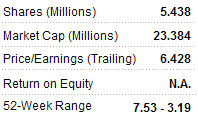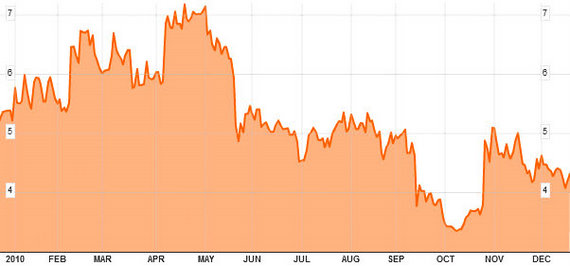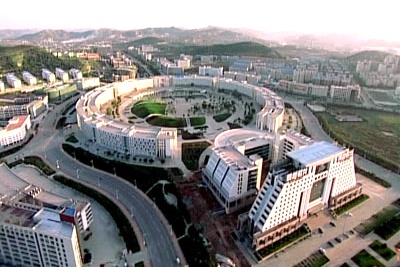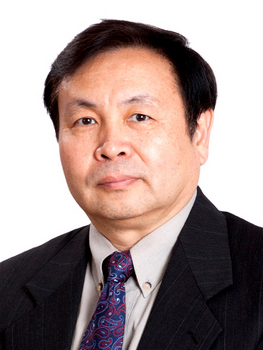
PANSOFT COMPANY LTD (NASDAQ: PSOF), a China-based specialist in enterprise resource planning (ERP) software with 80% exposure to the oil and gas sector, expects 60% top line growth for FY2011 on strong demand and solid support from Beijing.
NextInsight also learned in an exclusive interview with the Nasdaq-listed firm’s CFO that with China only accounting for 2% of global ERP sales, there is tremendous room for expansion.
Pansoft, which builds virtual hubs that connect business applications from across the software spectrum, offers custom-built and platform software (PanSchema) that enables companies to access independent business functions (like accounting, payroll, business intelligence) from a single database.
The bulk of Pansoft's revenue comes from PetroChina, Sinopec Group and their operating subsidiaries.
While some investors might be a bit wary of Pansoft’s apparent heavy reliance on a small client pool, the sheer size of the clients makes up for that and Pansoft’s top line shows no sign of slowing down, the company’s CFO Mr. Allen Zhang told NextInsight in an exclusive interview.
What is Pansoft doing now to help it meet its forecast for 60% revenue growth in the next reporting period?
Mr. Zhang: We are striving for good growth from large projects with our traditional clients in the oil and gas industry. Business from our long-term clients, PetroChina and Sinopec, has driven and will continue to drive our growth and represent a significant share of revenues, though it will represent a smaller proportion of total revenues as other sources grow at a faster pace.
We are paying particular attention to the subsidiaries of our major customers in the oil and gas industry, since these subsidiaries’ IT functions are operated independently from those of their headquarters. We have been increasing our investment to develop different solutions and establish new sales channels targeting this particular client group. We expect revenues from oil and gas subsidiaries to increase significantly in 2011 and beyond.

The coal-mining industry in China is currently in a consolidation phase, where many smaller businesses are being merged into much larger operations. There is currently no particular leading software service and development provider in this industry, which offers a good opportunity for Pansoft to step in. We have established an initial client base and sales channel with large coal-mining businesses, which we expect to become an additional significant revenue source.
We have received good contracts at HongAo, in which we acquired a majority stake this year, and we have secured a good number of contracts to sell their technology and expand the related application base among thermal power clients.
China has been a relative latecomer to the software industry. Can you talk a bit about why you think this is, and how you compare with Indian and US peers in the software industry, particularly for the market serving the ERP software and professional services provider for the oil and gas industry in China?

Mr. Zhang: China’s software industry, including ERP software, lags behind those of other countries, especially relative to its GDP. According to one report, ERP sales in China only accounted for less than 2% of the world market in 2007. In my opinion, this is mainly due to:
The average size of Chinese businesses is smaller than those in the U.S., therefore, a comparable level of IT demand has yet to be achieved.
In Chinese business culture, it is pretty commonplace that many business decision-makers, especially in state-run businesses, do not like to pay for software and even prefer to combine software with a hardware purchase order. Intangible software assets are hard define by fair market value, and therefore, are not considered a significant business asset. This practice impedes the software market and sales growth, especially for ERP software.
China’s outsourcing service market is smaller than India’s. However, China’s outsourcing service that targets Japan has been in growing rapidly, since China has a comparative advantage in language, similar to India with English. Pansoft recently invested into this sector to expand its presence in the Japan market.

Pansoft provides software system development for two large oil companies in China, which are at an exceptionally advanced stage in terms of IT system and software applications. IT systems have become part of their core business operations and receive high strategic consideration to enable fast growth. Therefore, the relative importance and budget allocation is above average compared to other businesses in China. Pansoft has been able to establish long-term IT partnerships with its oil and gas clients and has had a better level of success versus in other industries.
How reliant are your sales on the health and vitality of China’s oil and gas sector?
Mr. Zhang: We mutually depend on each other. More than 80% of our revenues derive from our large oil and gas clients. In turn, these clients also rely on our services, because we have developed and supplied the core systems to manage their general corporate financial and accounting operations. We have established profound domain knowledge in their operations and accounting practices. To switch to another other service provider, the learning curve would be extremely steep and costly, in addition to increasing the risk of system downtime. Therefore, we have a mutually beneficial partnership in IT between Pansoft and our large oil and gas clients, which is a healthy and sustainable relationship.
Additionally, although the oil and gas industry is dominated by three big names in China, they are not ordinary businesses with a single operation. They cover multiple sectors in the industry with thousands of subsidiaries, such as oil fields, petroleum sales companies (gas stations), oil logistics (pipeline management) and refineries. These subsidiaries each have independent IT demands from their own operations and production management. Pansoft has not yet penetrated this market thoroughly and considers these oil and gas subsidiaries as our next strategic market. We will develop strong and solid client bases in this area, taking advantage of our strong oil and gas industry expertise and applicable technology. This new strategic drive should expand Pansoft’s revenue significantly and also strengthen Pansoft’s leading position within its industry.
What percentage of your revenue do you reinvest in R&D, how does this compare to your global and domestic peers, and how important is R&D to Pansoft?
Mr. Zhang: Our reported R&D expense is relatively small and it understates our total R&D efforts, since there is much R&D integrated in our projects, especially large projects for large clients. In these types of projects, our budget and working hours include R&D processes to identify new business demands and requirements and to develop new solutions. Through this process, we have accumulated a several software tools, packages and components. We have also put tremendous effort and investment into developing our own tool-based platforms for both the J2EE and .NET development environments, which will significantly contribute to our system development efficiency and development processes so as to make system development less technical and require less writing software code.
What is the Chinese government doing to encourage the growth of Chinese ERP software firms, and is it enough?

Mr. Zhang: The Chinese government has granted tax deductions of 50-60% for software developers and, sometimes, direct subsidies on business expenses such as training costs and office rental (in designated industrial parks). These programs and preferential policies have promoted software business development, especially for start-ups, that have been recognized under certain criteria. However, in this recognition process, the size of operation, or its revenues, is a key criterion. This requirement makes smaller software businesses less likely to be able to access to government grants, tax refunds or subsidy programs. Moreover, due to higher HR expense in the software business, social welfare and other benefit contributions from software businesses counts as a large percentage of overall cost and is therefore a relatively large outlay. It would be beneficial for software businesses if such contributions could be eased.
You are planning to consider more M&A growth to supplement your organic growth. Why now? And will you be looking for market share, technology, or brand names when considering acquisitions, and in which order?
Mr. Zhang: China’s economic growth will increasingly be more attributed to operational efficiency improvements and the growing size of businesses. This trend will place more demands on software systems, especially for ERP. We want to leverage this opportunity to enlarge our business. We can sit and wait and still enjoy good profits, however, the business world is changing fast. We need to take aggressive action to increase our corporate size and scope of operations.
Our M&A targets in the software industry have the following three requirements:
Solid industry expertise with multi-year operational experience; a solid client base in the industry they serve; and positive cash flow.
How has your order book growth been this year and what are your predictions for next year?
Mr. Zhang: Most of our projected revenue is already contracted for the current fiscal year. We expect that revenue growth in fiscal 2012 will be on track with the average growth rate for the last five years, or roughly 40%.
Why does Pansoft choose to target the oil and gas industry, and any plans for significant ERP expansion into other industries?
Mr. Zhang: The oil and gas industry has been our core business since our inception, since many of our engineers have expertise in this industry and understand its business operations and requirements well.

The oil and gas industry has been our core business since our inception, since many of our engineers have expertise in this industry and understand its business operations and requirements well.
Our technical capabilities offer great advantages to serve our large clients that have multiple operations and therefore greatly depend on IT support for their daily operations. Any industries with a only few players with large market share and large operational size are a good fit for our software systems and service, such coal mining, thermal power, housing, that the other industries we are entering. As stated in previously, we will focus our strategic efforts on subsidiary companies in the oil and gas industry.
Your first quarter 2011 (July-September 2010) results were very robust. Did either the top or bottom lines surprise, or were both within expectations?
Mr. Zhang: Revenue growth for the quarter was in line with our annual guidance. Our Q1 profit was strong due to a higher amount of recognized revenue. The later months in the calendar year are usually the seasonally strongest for signing new agreements, collecting payments and making progress on revenue recognition, due to seasonal nature of our clients’ payment and budgeting cycle.
What are the top three contributing factors to the strong 1Q results?
Mr. Zhang: Good progress in the projects contracted with our traditional clients in the oil and gas industry, especially for large software system development and integration projects with Sinopec and PetroChina.
We started seeing a revenue and profit contribution from ITLamp, which we acquired in June.
We also started seeing “new revenues” from other industries, such as coal mining.
What is the most concrete guidance you can offer at this point?
Mr. Zhang: As stated recently, we expect 60% revenue growth and 20% profit growth in our fiscal 2011 business year.

